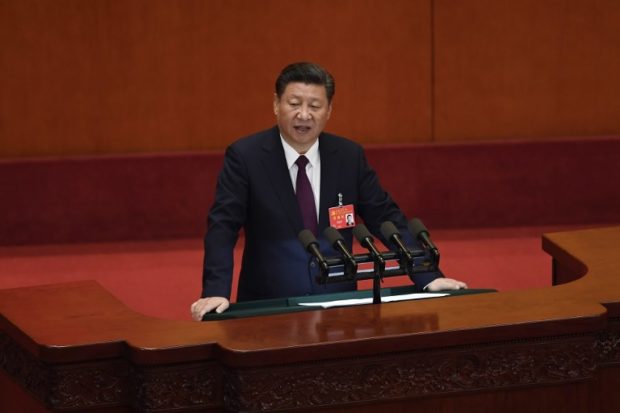Xi Jinping’s 2050 vision: A China that stands tall in the world

Chinese President Xi Jinping. AFP
Five years after he espoused his Chinese Dream of national rejuvenation, President Xi Jinping has presented his new 2050 vision for China: a modern socialist country that can stand tall in the world.
In setting the ambitious goal, to be achieved in two phases, Xi has shown awareness of the challenges and risks ahead.
“Achieving national rejuvenation will be no walk in the park; it will take more than drum beating and gong clanging to get there,” he told more than 2,200 party delegates, retired leaders and non-party guests at the opening of the Chinese Communist Party’s (CCP) 19th national congress on Wednesday.
“Realizing our great dream demands a great struggle,” he said. “It would involve responding to major challenges, withstanding major risks, overcoming major obstacles and addressing major conflicts.”
The two-stage goal will see China become a top innovative nation by 2035 and a nation with global influence by 2050.
Article continues after this advertisementXi, the CCP’s general secretary, was giving the party’s political report that looks at its work over the past five years and charts the direction for the next five with him still at the helm.
Article continues after this advertisementProfessor Yang Dali of Chicago University noted that Xi’s goal was very ambitious in terms of laying out what it means to be a modern country.
“In the past, this was weakly described,” he said.
Now, Xi has clearly stated that by 2050 China would become a modern socialist country that can stand tall among other nations, Prof Yang added.
In essence, it is a goal in which “China will continue to grow and China will be so developed in all aspects that it will be truly a superpower”, he said.
In a broad-ranging speech that lasted nearly 3 1/2 hours, Xi pointed to the need to address imbalances in social and economic development by putting more effort into poverty alleviation, investing more in education, healthcare and welfare benefits, and boosting economic growth through measures such as structural reform and innovation.
He also expounded on a “new era” – a phrase he used 36 times – for socialism with Chinese characteristics, which is China’s special brand of socialism that incorporates aspects of the market economy with state capitalism.
He touched on keeping the party and government clean through an anti-corruption campaign and instilling party discipline.
Beyond socio-economic and environmental issues, which are close to the people’s hearts, Xi also spoke about China’s place in the world – it is the CCP’s abiding mission to make new and greater contributions to mankind – and safeguarding the country’s territorial integrity.
Said Prof Yang: “If one leaves aside the politics, there are a lot of things in the speech that a lot of people would like.”
Some Chinese citizens who heard the speech, like civil servant Lu Hengjiu, would agree.
“(The) brilliant content, clear thinking and the raising of subjects like new era, new thinking and new goals are rather inspiring,” said Lu, 37.
What especially resonated with him was Xi’s observation at the end of his speech that China’s future lies in its young people.
Xi said: “A nation will prosper only when its young people thrive, a country will be full of hope and have a great tomorrow only when its younger generations have ideals, ability and a strong sense of responsibility.”